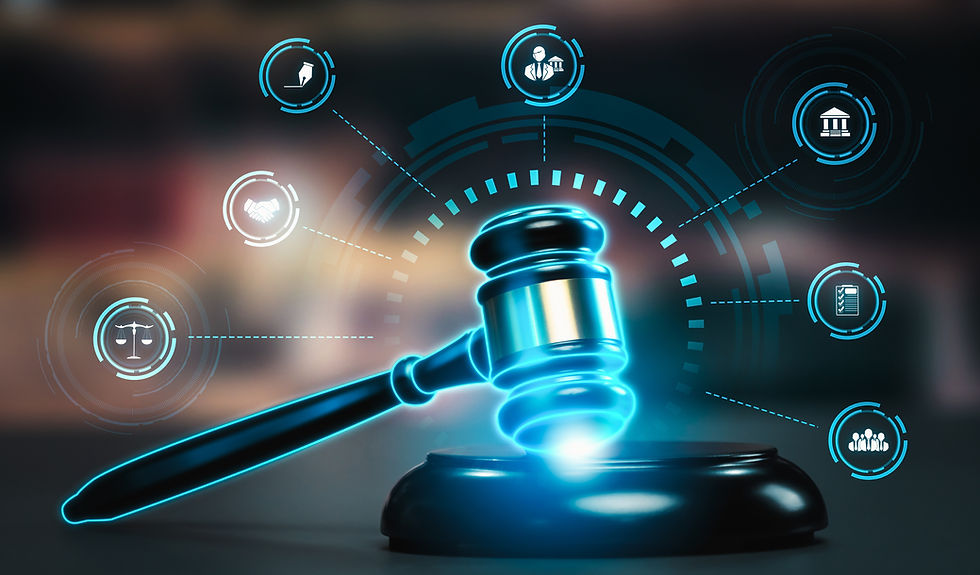Exploring the Best Legal Technology Trends of 2024
- Portal Administrator

- Jun 19, 2024
- 3 min read

The legal industry is no stranger to technological innovation and 2024 is bringing even more advancements designed to enhance efficiency, security, and productivity. As law firms and legal professionals embrace these emerging technologies, they can expect significant improvements in their work with innovative legaltech products like Verify 365 and DynamicID making an impact at law firms across the UK. Here, we delve into the most impactful and best legal technology trends of 2024 that are set to revolutionise the legal landscape.
The Best Legal Technology Trends of 2024
1. Automation: Streamlining Legal Processes
Automation technology is transforming how law firms handle repetitive and time-consuming tasks. Law firms can drastically reduce manual labour and minimise the risk of human errors by automating processes such as document drafting, client intake, and compliance checks. This shift ensures consistency in legal documents and procedures and allows legal professionals to focus on more strategic and high-value activities.
2. Legal Case Management Software: Centralising Operations
Legal Case Management Software is becoming indispensable for law firms. It centralises case files, communications, billing, and scheduling into a single platform. This integration improves efficiency by automating administrative tasks, enhancing case tracking, and improving client relationship management. By using such software, law firms can increase productivity and reduce the potential for human error, ultimately allowing lawyers to dedicate more time to substantive legal work.
3. Artificial Intelligence: Enhancing Decision-Making
Artificial Intelligence (AI) continues to lead the way in legal innovation. AI tools offer capabilities such as predictive analytics for case outcomes and automation of complex document review processes. These tools help law firms analyse vast amounts of data, make informed decisions, streamline litigation preparation, and provide personalised client interactions. AI's ability to handle large datasets efficiently positions it as a critical asset in the modern legal environment.
4. Litigation Management: Improving Workflow
Advances in litigation management software provide comprehensive tools for case management, document storage, and team collaboration. These platforms ensure a seamless flow of information across legal departments, regardless of location, and facilitate efficient management of litigation portfolios. Features like deadline tracking, evidence management, and secure communication enhance the litigation process and decision-making.
5. Virtual Legal Assistants: Optimising Client Interaction
Virtual Legal Assistants (VLAs) represent a significant technological advancement in the legal industry. Leveraging AI, VLAs perform tasks that traditionally require human intervention, such as scheduling appointments, organising meetings, and sending reminders. This optimisation allows lawyers to concentrate on in-depth analysis, strategy development, and personalised client counselling, which is essential for successful legal representation.
6. Identity Management: Ensuring Security
Identity management has become crucial in legal tech, focusing on securing digital identities and access controls. Advanced solutions for user authentication, access rights, and activity monitoring help law firms detect and prevent unauthorised access to legal data. Biometric authentication methods, such as fingerprint scanning and facial recognition, offer more secure alternatives to traditional passwords, streamlining the client onboarding process and enhancing overall security.
7. Data Protection: Maintaining Confidentiality Client
Data protection remains a top priority for law firms, necessitating the adoption of advanced encryption technologies and secure communication channels. By focusing on data security, law firms can protect client confidentiality, comply with data protection regulations, and prevent breaches. Maintaining high levels of data security is essential for upholding client trust and meeting professional responsibilities.
8. Legal Contract Management: Leveraging Blockchain Smart
Smart legal contract management utilises blockchain technology to revolutionise the drafting, execution, and enforcement of legal agreements. By embedding contract terms directly into code, smart contracts automate processes when conditions are met, eliminating the need for manual intervention. This approach reduces ambiguity and disputes associated with traditional contracts, offering a secure and efficient solution for complex transactions.
9. Advanced Computing: Enhancing Research and Analytics
The advent of quantum computing and other advanced computational technologies is poised to impact the legal industry significantly. These technologies offer enhanced processing capabilities, enabling more efficient analysis of complex legal scenarios and large datasets. While still in development, advanced computing is expected to refine legal research, improve predictive analytics, and support more effective decision-making processes.
10. Immersive Technology: Innovating Legal Training and Presentations
Immersive technologies such as Virtual Reality (VR) and Augmented Reality (AR) are beginning to impact the legal field. These technologies can recreate crime scenes in VR for evidence presentation or employ AR for enhanced document examination. They also offer innovative training methods by simulating various legal scenarios and environments. VR and AR enable lawyers to conduct negotiations and other interactions without face-to-face meetings, showcasing their potential in modern legal practice.
As the legal industry evolves, embracing these technological trends will be crucial for law firms aiming to stay competitive and deliver exceptional client service. By integrating these advancements, legal professionals can enhance workflows, ensure data security, and provide more effective legal solutions.
Main di kabar4d puas!